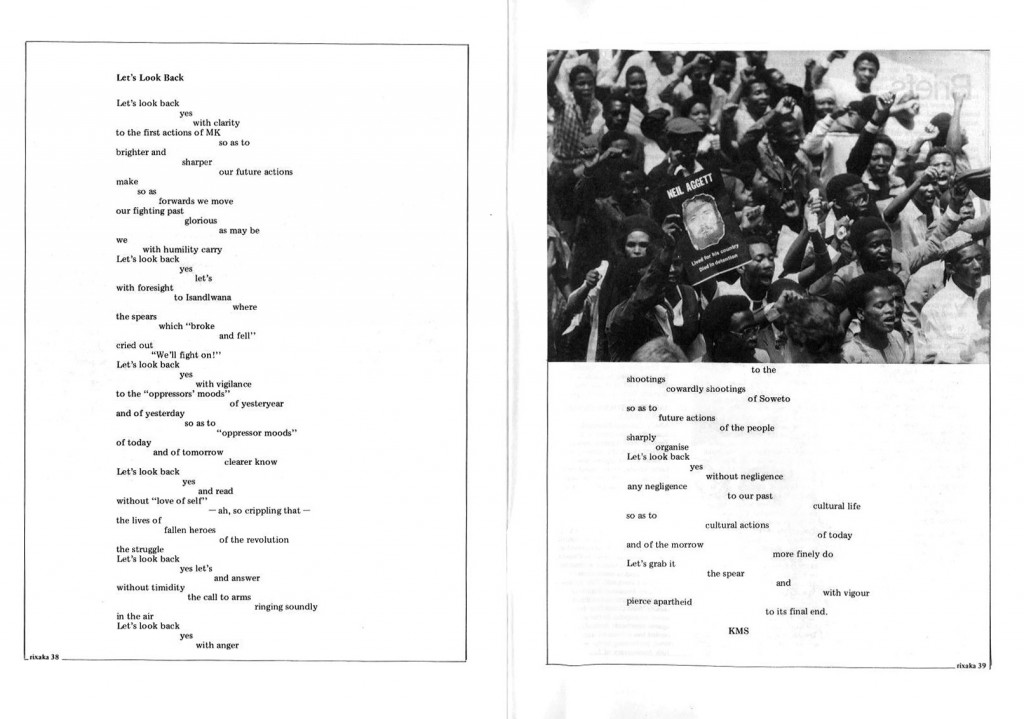
‘Let’s Look Back’ by KMS, (Click to enlarge), taken from Rixaka – Cultural Journal of the African National Congress, March 1986
The power of the archive lies in our ability to ‘look back’, to sit with the privilege of hindsight, learning about what was, thinking about what could have been and speculating about what’s to come. Source material helps shape our understanding and transform previous assumptions. The past comes alive, and through us, the struggles and successes are overcome and won again; never to be forgotten.
The fight against the apartheid regime may still be close, but before too long will fall out of living memory. The presence of archives, not only in South Africa, but across the world preserves the international campaign, the efforts of groups and individuals, which led to the successful abolition of an apartheid state and freedom for South Africa. Here in Glasgow, in the Archives Department of Glasgow Caledonian University, we are proud to hold the Archives of the Scottish Anti-Apartheid Movement.
Thanks to a grant from the National Cataloguing Grants Programme for Archives, over the next ten months the entire Archives of the Scottish Anti-Apartheid Movement will be catalogued, providing a rich resource for education and inspiration.
Study or flick through any of the material, and what will strike you is the human touch and emotion that is present in every item. Salutations such as ‘brother’ and ‘comrade’ unite strangers in their cause. There are mail-outs in the form of birthday cards celebrating Mandela’s 70th birthday, of which half is kept as a memento and half is sent with a donation to Mandela in prison on Robben Island. In another folder are piles of handwritten attendance cards from conferences with personal details – names, addresses and organisations – written by people who took the time to care. These sit alongside dense official documents and remind us that each individual’s role, even without official capacity, helped to make a difference.
We will be sharing our discoveries monthly, and musing on how the coming together of different groups across the nation, and world, helped to change a country’s future.
Having opened with a poem from South Africa, we’ll end with a song from Scotland. The title of this project has been taken from the Robert Burn’s song A Man’s A Man For A’ That, written in 1795. It is a song that speaks of united struggles and egalitarian ideas, whose meaning translates across time, class, creed and culture.
Then let us pray that come it may,
(As come it will for a’ that,)
That Sense and Worth, o’er a’ the earth,
Shall bear the gree, an’ a’ that.
For a’ that, an’ a’ that, It’s coming yet for a’ that,
That Man to Man, the world o’er,
Shall brothers be for a’ that.
A Man’s A Man For A’ That, Robert Burns
Julia Wylie, Project Archivist
I am a South African who studied in Edinburgh between 1981 and 1985 during my exile years. I was part of the anti-apartheid structures there. I still keep in touch with some of my comrades there and sometimes get a chance to return. The experience was an important part of my life.
Hello Hassen Ebrahim, thank you for reading our blog and leaving a comment. It is wonderful that the blog is reaching people all over the world. We were very interested to hear about your connection to Scotland and the Scottish Anti-Apartheid Movement. You mention that you occasionally come back to Scotland, on your next trip back we’d like to invite you to come and visit the archive, and the SC AAM collection, as we’d love to meet you and hear more. We hope that you will watch the blog, and our discovery of the collection, unfold with interest.
Julia Wylie, Project Archivist.